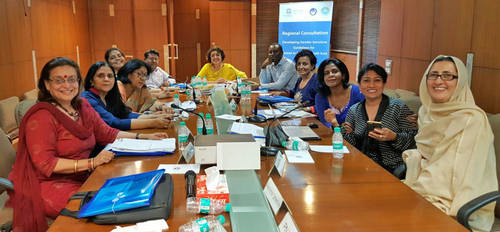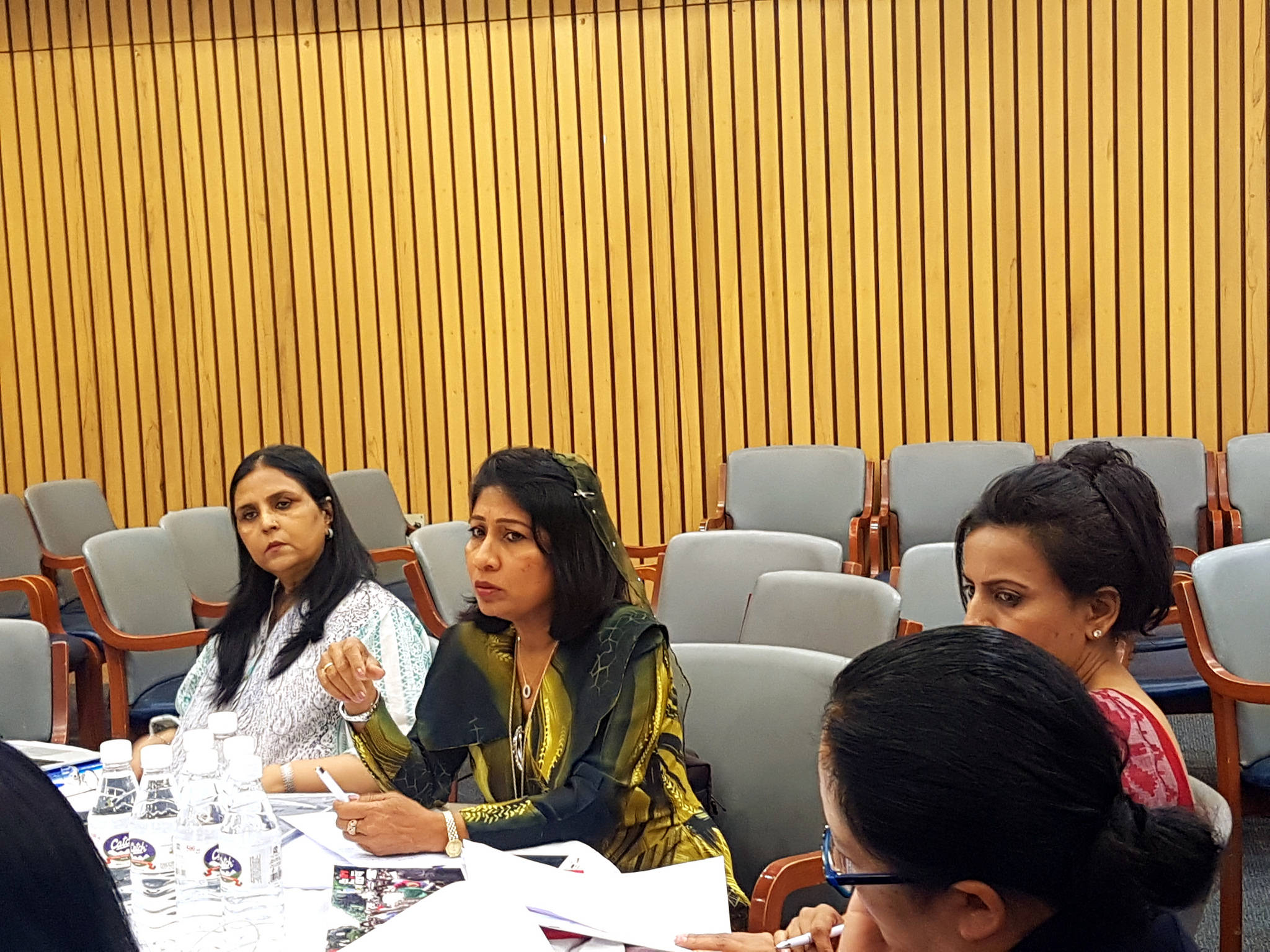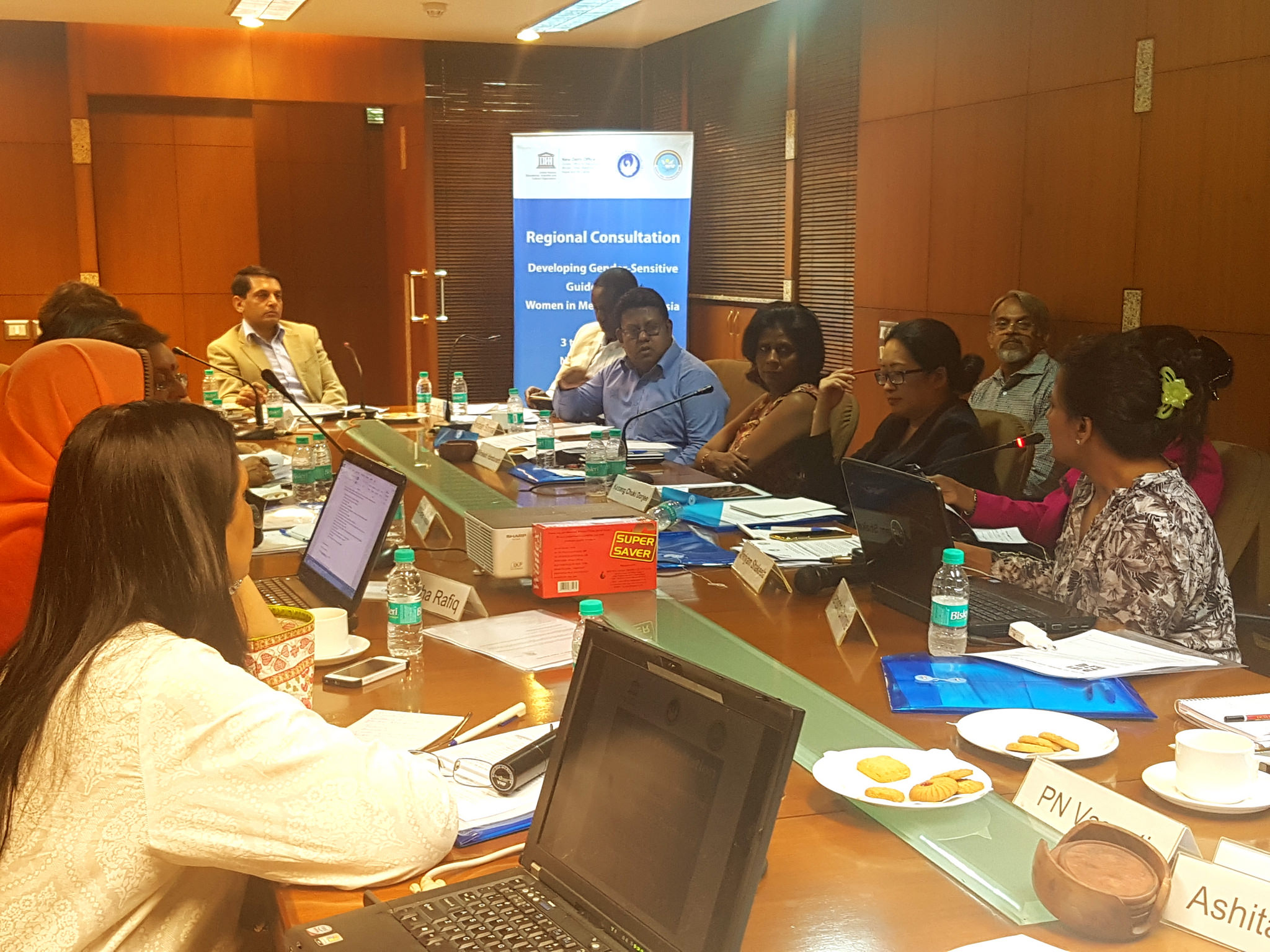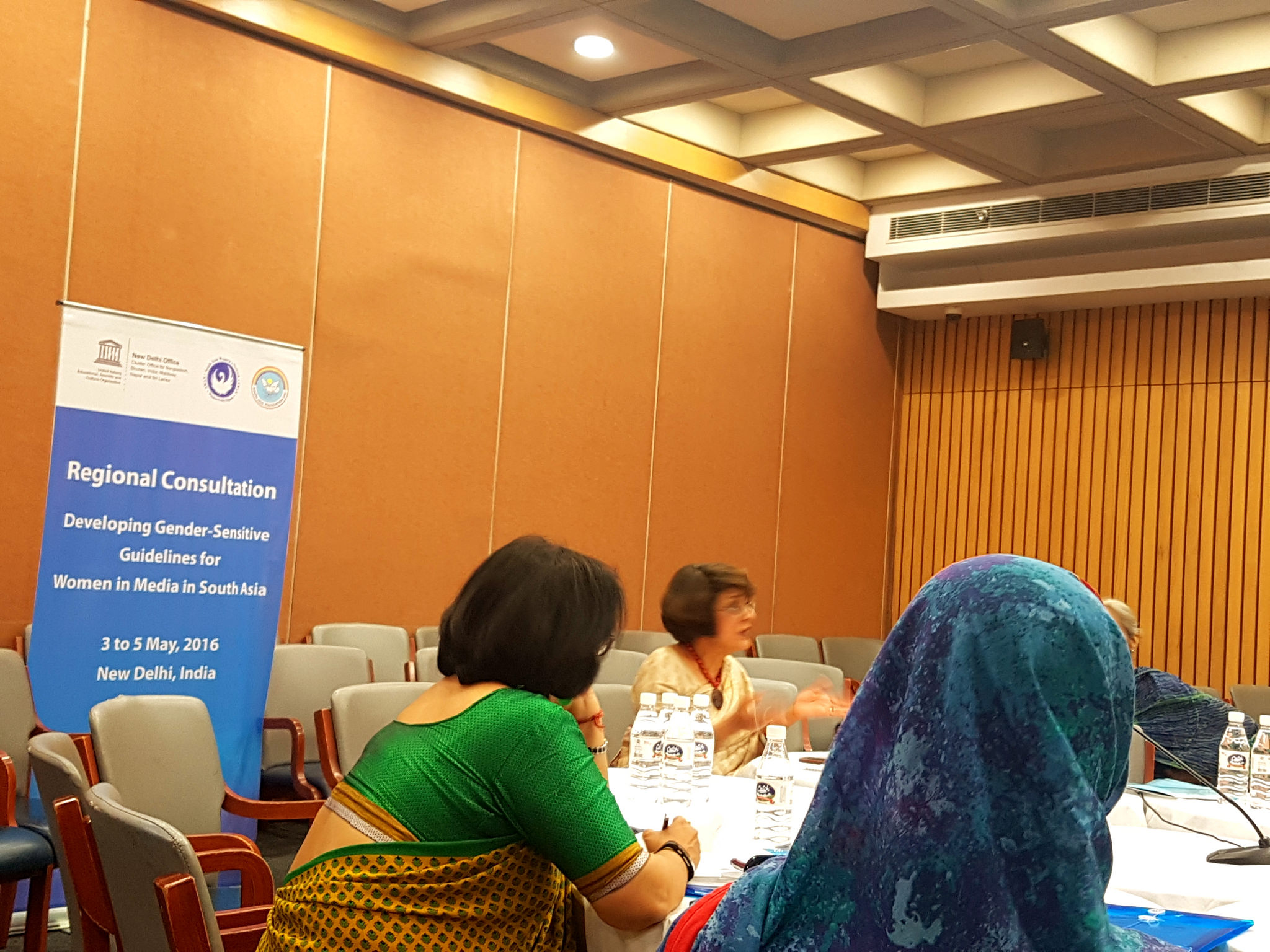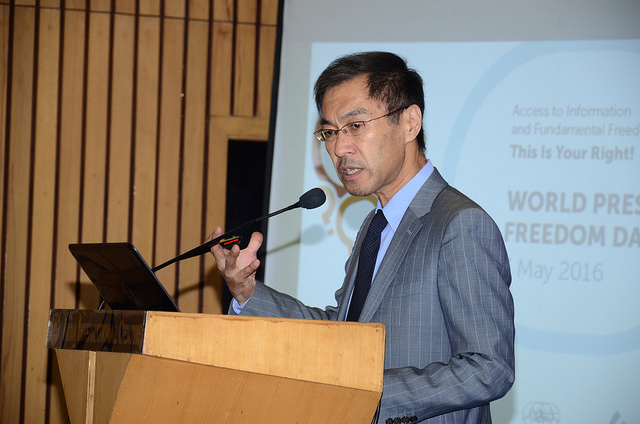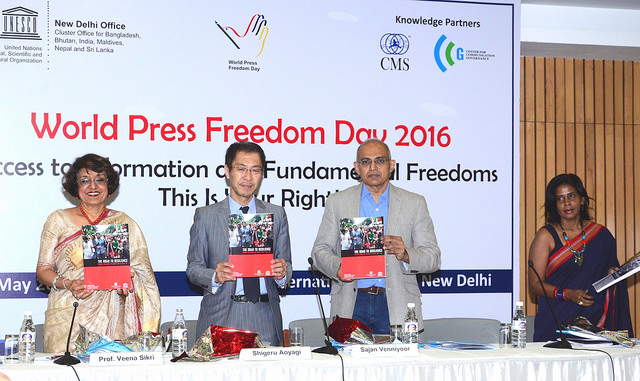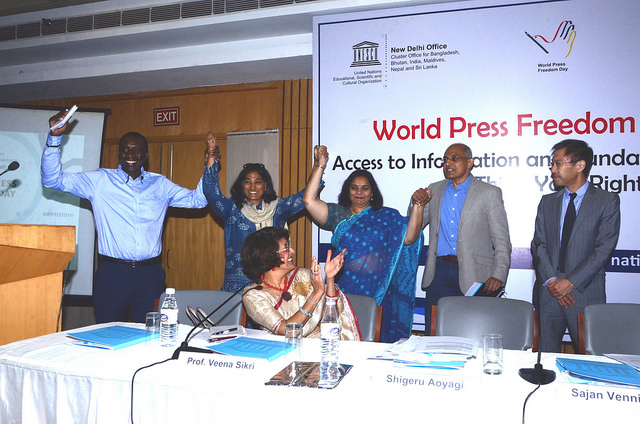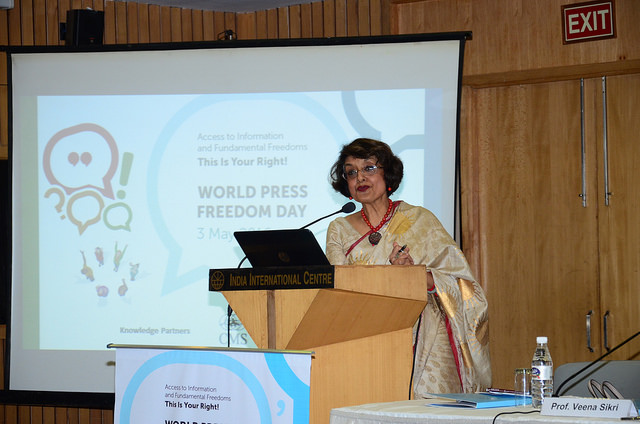REPORT ON UNESCO-SWAN REGIONAL CONSULTATION: DEVELOPING GENDER SENSITIVE GUIDELINES FOR WOMEN IN MEDIA IN SOUTH ASIA. New Delhi May 03 – 05 2016
In 2014, UNESCO and South Asia Women’s Network (SWAN)[1] launched a joint initiative titled ‘ Women for Change: Building a Gendered Media in South Asia‘. The initiative seeks to:
- Develop tools and knowledge products, including a gender policy and common minimum standards for adoption by media houses in the region.
- Build the capacity of women journalists to mainstream gender in reporting; and sensitize editors and gatekeepers about the need for gender‐sensitive reporting.
- Strengthen the network of women journalists across South Asia in order to:
- Facilitate the sharing of good practices, country cases, journalistic experiences, and knowledge products.
- Monitor trends related to women in the media, develop strategies for mainstreaming gender in the media, and conduct advocacy on related themes.
The Regional Consultation in New Delhi from 3 to 5 May, 2016, is the first step in the implementation of the UNESCO-SWAN Women in Media Initiative. SWAN thanks UNESCO Regional Office, New Delhi and South Asia Foundation (SAF India) for their support in making this regional consultation a success. In particular, SWAN thanks Mr Shigeru Aoyagi, Director and UNESCO Representative for Bhutan, India, Maldives and Sri Lanka, for his assurances of continued support in the implementation of the program agreed upon.
The seven participating countries in this consultation are: Afghanistan, Bhutan, India, Maldives, Nepal, Pakistan and Sri Lanka. The Agenda for the Regional Consultation is at Annexure A. The list of participants is at Annexure B. Bangladesh and Myanmar, who are a part of this initiative, were unable to participate this time.
UNESCO and SWAN agree on the critical role of the media as a reflection of society and an agent of change, through media freedom with responsibility. UNESCO and SWAN recognize the importance of gender empowerment as a key to sustainable economic growth, social development, environmental sustainability, and promotion of peace in South Asia. If sufficiently empowered, women in media across South Asia can themselves play a critical role in creating awareness about the need for gender empowerment and for building inclusive societies. Women in media can become agents for bringing in the change they want to see.
Throughout the discussions at the Regional Consultation, the need to deter and counter gender-based violence (GBV) and sexual harassment were high-lighted. These are cross-cutting priority issues that adversely impact every aspect of women’s work in media.
In order to address the vulnerability of women journalists in South Asia, media needs to be gender sensitive, gender responsive and gender transformative. In order to strengthen these roles, UNESCO and SWAN agree to :
- Develop gender sensitive media guidelines and standards, targeting women journalists, media owners, editors and policy makers.
- Undertake a baseline survey to assess the status of women media practitioners in South Asian countries, thereby providing a basis for monitoring and evaluation, together with a roadmap for measuring annual progress and achievements .
- Develop a methodology for advocating the adoption of the proposed guidelines and standards.
- Develop a mechanism for implementing this initiative in the participating South Asian countries .
- GENDER SENSITIVE GUIDELINES FOR WOMEN IN MEDIA IN SOUTH ASIA
The Regional Consultation agrees that the guidelines should cover print, electronic and online media, including advertising. Entertainment media, given its rising consumption and importance on these platforms, is also included in these guidelines.
In developing these guidelines, the Regional Consultation acknowledges and relies upon the UNESCO Gender Sensitive Indicators for Media. In developing the baseline survey the Regional Consultation acknowledges and relies upon the International Federation of Journalists’ (IFJ) Questionnaire for the Survey on Gender and Media in Asia Pacific, which was supported by UNESCO and UN Women.
The Gender Sensitive Guidelines for Women in Media in South Asia (GSGWMSA) are categorized under the following heads:
- Gender Equality for Women in Media
- Gender Balance at all Decision Making Levels
- Gender Equality in work and working conditions
- Gender Equality in unions, associations, clubs and organizations of journalists, other media professionals and media self-regulatory bodies
- Gender Balance in Education and Training
- Ethical codes for gender sensitive editorial policies in Media organizations
- Guidelines for Owners and Decision Makers in Media
- Addressing Gender Based Violence (GBV) and Harassment at work
- Portrayal of Women in Media
- News and Current Affairs
- Entertainment
- Online
- Advertising
A 1. Gender Balance at all Decision Making Levels
- Development of transparent equal opportunity policies within media houses in an inclusive manner.
- Development of comprehensive implementing measures (for equal opportunity policies), with timelines and monitoring mechanisms.
- Adoption of affirmative action programs and policies to ensure equal opportunity for women, including through job announcements and other publicity.
- Specific budgetary allocation to support comprehensive equal opportunity policies.
- To incentivize implementation of best practices in promoting gender equity through recognition / awards.
A 2. Gender Equality in work and working conditions
- Transparency and gender parity in recruitment practices and policies at all levels, including for contractual and part time workers.
- Measures and policies to ensure equitable working conditions: including provision of nurseries and crèches, maternity and paternity leave, flexi-hours, canteens, late night transport and separate toilets.
- Equal pay for equal work, including equal promotion opportunities and equal access to all benefits.
- Gender responsive budgeting with participation of women, together with regular gender audit as per the statutory cycle.
- Inclusive monitoring mechanisms, including cyclical reviews of these policies.
- Existence of gender sensitive HR policies, and ensuring adequate publicity for the same.
- Establishment of formal prevention of discrimination and women’s complaints redressal mechanisms within the organization
A 3. Gender Equality in unions, associations, clubs and organizations of journalists, other media professionals and media self-regulatory bodies
- Establishment of media associations, unions, and organizations of journalists wherever they do not exist, with a focus on gender parity and increase in female leadership.
- Increase membership and leadership of women in existing structures.
- Establishment of women specific associations / networks
- Existence of mandatory gender policies and gender responsive mechanisms within these structures.
- Introduction and implementation of biannual and annual evaluation and monitoring systems that measure women’s participation and influence in decision making in all activities and programs at all levels.
A 4. Gender Balance in Education and Training
- Gender sensitization of senior management and staff of universities, media and communication schools, training institutions, advertising agencies and NGOs.
- Development of gender sensitive curricula and integrating gender specific content and mainstreaming gender in these curricula through inter disciplinarity.
- Introduction of gender studies in media and communication institutions.
- Gender parity among faculty of education and media/communication training institutes.
- Equal opportunities for enrollment of male and female students at all levels in all academic and training institutions.
- Integration of gender sensitive measures within the learning environment.
- Mandatory training programs (for men and women) in order to ensure physical and digital safety of women media workers
A 5. Ethical codes for gender sensitive editorial policies in media organizations
- Development and implementation of a comprehensive written gender policy and standardized code of ethics in consultation with all tiers of media workers.
- Development of a gender sensitive style book, gender glossary, use of gender neutral language, and standardized training manual and a directory of women experts to adopt gender sensitive media practices.
- Conduct awareness and training of all staff within media organizations on gender policy and gender sensitive code of ethics, for minimum 24 hours in a year
- Institutionalization of gender based complaints mechanism for in-house staff and for the public .
- Raising public and staff awareness about the existence of such mechanisms.
- Establishing a monitoring protocol to measure the effectiveness of gender policies and mechanisms.
A 6. Guidelines for Owners and Decision Makers in Media
- Ensure implementation of policies that are gender sensitive, gender responsive and gender transformative.
- Rewarding and incentivizing compliance with these policies.
- Ensuring the setting up of a functional complaints’ redressal system.
- Allocation of resources for gender sensitive budgeting and gender auditing.
- Facilitation of women leadership through affirmative action.
- Mandatory regular training programs (for men and women) to ensure physical and digital safety of women media workers
A 7. Addressing Gender Based Violence (GBV) and Harassment at work
- Development and implementation of a policy to effectively deter and counter gender based violence (GBV) and sexual harassment at the work-place, and in the field.
- Create awareness and understanding (among men and women) about the importance of and the need to strictly adhere to all aspects of the policy on Avoiding and Ending GBV and harassment.
- Create mechanisms at all levels to address sexual harassment and gender based violence.
- Setting up of an effective complaints’ redressal system and establishing a mandatory sexual harassment committee/cell that can receive and address all complaints in a speedy, time-bound manner.
- Annual assessment of the complaints and redressal mechanism.
- Advocacy with governments on strengthening the laws and widening the scope of measures against GBV and sexual harassment.
- B. Portrayal of Women in Media:
- News and current affairs
- Entertainment
- On-line
- Advertising
- Depiction of GBV and Sexual Harassment through the media
B 1. News and Current Affairs
- Gender parity in news and current affairs content development.
- Equal representation of women as spokespersons, experts and interviewees.
- Gender balance in eliciting opinions on various topics
- Specific focus on highlighting/mainstreaming women’s issues
- Balance in the proportion of time and space given to women’s stories/issues
- Editorial policy to promote gender-sensitive and gender-inclusive language
- Regular assessment, evaluation of content by senior editorial staff (with adequate representation of women)
- Gender-sensitive training for media students, professionals, managers and owners
B 2. Entertainment
- Develop inclusive gender content and language to counter stereotypical portrayal of women
- Regular training for writers, producers, directors and actors for gender-sensitive content and characterization
- Measures to counter Ratings driven content that is not gender respectful. Such measures should address directors, producers and viewers
- Portray women in diverse roles in a dignified manner
B 3. On-line
- Disseminate information and create awareness on cyber laws amongst media workers
- Ensure effective implementation of cyber laws, particularly those dealing with stalking, photo-morphing, trolling and use of abusive language (reference A 6 v above)
- Ensure implementation of cyber guidelines for gender-sensitive content
- Quarterly surveillance of content and redress for bullying and harassment
B 4. Advertising
- Ensure no objectification of women
- Avoid stereotypical images of women that denigrate their dignity and lower their respect
- Advertising councils and regulatory bodies must be pro-active in putting measures in place to present a positive image of women.
B 5. Depiction of GBV and Sexual Harassment through the media
Addressing issues relating to depiction of GBV and sexual harassment as part of portrayal aspects under B 1 to B 4 above : are current guidelines and laws adequate to handle the serious mal-portrayal of women through the media?
- The first draft of the Gender Sensitive Guidelines for Women in Media in South Asia (GSGWM) is listed above. The next steps are listed below:
- Informal discussions and consultations with respective stakeholders in each SWAN country, including National Commissions of Women, women journalists (seniors and freshers, in urban metros and in rural areas) and UNESCO offices. Feed-back to be received by September 2016, and collated.
- Finalization of the Guidelines at SWAN’s Annual Conference in October 2016
- UNESCO and SWAN to present these Guidelines to the SAARC Summit in Islamabad in November 2016
- Baseline survey to assess the status of women media practitioners in South Asian countries, together with a roadmap for measuring annual progress and achievements :
It was suggested that a baseline study on women in media across all South Asian countries be conducted to feed into the development of the Guidelines, documenting the current scenario and also for advocacy purposes.
More specifically, this research study will be developed as part of an overall monitoring and evaluation framework to further guide and implement the Guidelines. The methodology and design of the study will follow a mixed methodology approach. Three distinct components of this research framework are envisaged as :
- Baseline Round (year 1)
- Monitoring Rounds (in year 3, 4 & 5)
- Midline Round (in year 6)
This research component will be supervised and coordinated by the Centre for Media Studies (CMS), a Delhi based specialized research think tank (www.cmsindia.org). The research design, methodology, tools and report templates will all be finalized in discussion with respective country research teams set up by SWAN members (research tools and guidelines will be adapted from IFEJ Gender Survey). The data collection will be undertaken by respective country teams, using the finalized research tools and guidelines. CMS will provide orientation on methodology and tools used for data collection. The data analysis and tables will be conducted by CMS with the raw data (in given templates) send by each country teams. CMS will also undertake the India component of the study and will provide an overall South Asian scenario.
- Baseline Study
Objectives of this exercise are as follows:
- To examine the portrayal of gender issues in media (news and entertainment media)
- To map situation of women in media in terms of their role and responsibilities
- To measure perception of gender sensitiveness of media
- To compile existing research /literature on the issue
- To contribute in development of indicators and standards for gender sensitiveness of media
A combination of methodologies is proposed for the baseline survey on gender sensitive media ecosystem in South Asia (total time required is around six months) is as follows :
- Sample media content analysis for 10 days (time period to be same for all countries and will be decided after discussions) of select print media / television news / television entertainment/ radio programs
- Online survey of media professionals, including in-person survey as and where required.
- In-depth interviews (IDI) with select academics, experts and media professionals (minimum 30) – open ended questionnaire to be used (also for compilation of case studies)
- Secondary review of studies/ surveys and compilation of available data
- Advisory board in each country to provide inputs and review reports
- Seminar/consultations to share and validate findings
The first four methods will be the main data collection techniques for this baseline study and the latter two methods will be for triangulation of findings from each respective country.
Details of each methodology and sampling, along with draft tools are enclosed in Annex.
- Monitoring mechanisms (for three rounds)
- Awards (with inbuilt reporting)
- Workshops and conferences
- Online SA resource repository & documentation of good practices and creating a website
These suggested mechanisms are for monitoring implementation and advocacy outcome of the guidelines. These will be specially designed to gather relevant information/ indicators for measuring progress on the implementation of the guidelines, along with built in advocacy component. For example, the Awards will be an incentive for media organizations to share relevant organizational details for eligibility and also be a role model for other media organizations. Similarly, regular workshops and conferences in each country will provide an opportunity to advocate for more gender sensitive media while also documenting trends.
iii. Midline survey (after 5 years of baseline in year 6)
This midline study will be in line with the baseline to provide evidence on progress made in each country on the guidelines and being more gender sensitive and inclusive. The monitoring mechanisms and midline survey together will provide markers for respective countries and also inputs for revisions required in the guidelines. These two components will be finalized after completion of the baseline survey and discussions.
Each SWAN participant (in the Regional Consultation) will provide feedback, with full details, on partners who will conduct the baseline survey in their respective countries, by end of May 2016. Based on the sample and methodology note (being circulated alongside) and the budget template draft already shared, a baseline survey proposal with budget is expected from each country. CMS will coordinate and compile all these proposals for a joint submission for grants.
III. Methodology for advocacy for adopting the Guidelines
Based on the findings of the baseline survey, following is the methodology and tools proposed for advocacy
- Advocacy with Government for all those aspects in the guidelines that are relevant for policy making, such as working condition for women in media, equal opportunity for women in media, equal salary and benefits, etc
- Advocacy with owners and editors
- Advocacy with Unions, associations , academia, civil society , international organizations and other interest groups
This will be done first through informal consultations, then through email campaigns, interviews and series of seminars and workshops held in individual countries as well as regionally. (Separate budget to be prepared for advocacy).
IV Mechanisms for implementing the UNESCO SWAN Women in Media initiatives
The results of the advocacy initiative (at III above) will determine the extent of acceptability for implementation of the GSGWM.
The baseline survey monitoring and evaluations mechanisms will track the implementations through awards and online documentations of good practices through the website.
Funding for advocacy and implementation of GSGWM will be sought through UNDP, EU, SAARC Development Fund (SDF).
Annexure A : AGENDA
UNESCO–SWAN Regional Consultation (3–5 May 2016)
Developing Gender Sensitive Guidelines for Women in Media in South Asia
2nd May 2016 : Arrival and Stay at USI Residency Resort, Vasant Vihar, New Delhi-110057
| DAY 1: 3 May 2016 | |
| Timing | Session |
| 10.00 – 1.15 pm | Observance of World Press Freedom Day 2016 at India International Centre
VENUE : India International Centre (New Conference Block), 40, Max Mueller Marg Off Lodhi Road), New Delhi-110003 |
| 1.15 – 2.30 pm | Lunch |
| 2.30 – 3.00 pm | Inauguration of Regional Consultation: Outline of the objectives and expected outcomes of the consultation, and building a consensus about the vision / principles behind the proposed guidelines – Prof. Veena Sikri, Vice Chairperson, South Asia Foundation (SAF-India) and Convener, South Asia Women’s Network (SWAN)
(Note: Gender-based violence is to be highlighted as a cross-cutting issue) VENUE : India International Centre (New Conference Block), 40, Max Mueller Marg Off Lodhi Road), New Delhi-110003 |
| 3.00 – 4.00 pm | Session 1: Visioning exercise |
| 4.00 – 4.15 pm | Tea and coffee |
| 4.15 – 5.30 pm | Session 2: Working conditions for women in the media in South Asia
Session Lead : Ms Coomi Kapoor, Contributing Editor, The Indian Express |
| DAY 2: 4 May 2016 | |
| Timing | Session |
| VENUE : South Asia Foundation (SAF-India), A-33, Vasant Marg, Vasant Vihar, New Delhi-110057 | |
| 10.00 – 11.30 am | Session 3: Gender balance in education and training (pre-service and in-service training)
Session leads : Dr Shashidhar Nanjundaiah, Dean, India Today Media Instt
|
| 11.30 – 12 noon | Address by Mr Shigeru Aoyagi, Director and UNESCO Representative to Bhutan, India, Maldives and Sri Lanka; followed by tea and coffee |
| 12 – 1.30 pm | Session 4: Gender-based violence and the role of media
Session Lead : Ms Pamela Philipose, award-winning editor, author and columnist, former editor-in-chief, Women’s Feature Service (WFS) |
| 1.30 – 2.30 pm | Lunch |
| 2.30 – 4.00 pm | Session 5: Gender portrayal in media and advertising |
| 4.00 – 4.15 pm | Tea and coffee |
| 4.15 – 5.45 pm | Session 6: Methodologies for the design, monitoring and evaluation of the guidelines
Session Lead : Ms PN Vasanti, Director General, Centre for Media Studies (CMS), Saket, New Delhi |
| 7:00 pm Dinner at SAF-India | |
| DAY 3: 5 May 2016 | |
| Timing | Session |
| VENUE : South Asia Foundation (SAF-India), A-33, Vasant Marg, Vasant Vihar, New Delhi-110057 | |
| 10.00 – 11.30 am | Session 7: Roadmap for drafting and implementing the regional guidelines (including advocacy and timeframes) |
| 11.30 – 11.45 am | Tea and coffee |
| 11.45 – 1.15 pm | Session 8: Drafting of guidelines begins |
| 1.15 – 2.15 pm | Lunch |
| 2.15 – 3.45 pm | Session 9: Drafting of guidelines continues |
| 3.45 – 4.00 pm | Tea and coffee |
| 4.00 – 5.30 pm | Closing session: Endorsement of draft guidelines and the way forward, and closing remarks |
Friday, 6th May, 2016 : Departure as Convenient
UNESCO SWAN Regional Consultations on Developing Gender Sensitive Guidelines for Women in Media in South Asia New Delhi, 3-5 May 2016
LIST OF PARTICIPANTS
Afghanistan
- Ms Zulaikha Rafiq,
Professional Consultant,Kabul
Bhutan
- Ms Kesang Chuki Dorjee,
Member of Parliament,
Managing Director, KCD Productions,
Thimphu, India
- Professor Veena Sikri,
Former Ambassador,
Founder and Convener,
South Asia Women ‘s Network (SWAN), Vice Chairperson, South Asia Foundation (SAF-India), New Delhi
- Ms Nandini Sahai.Director,
Media Information and Communication Centre of India (MICCI)
New Delhi
- Ms Sohaila Kapur,
Freelance Anchor and Journalist,
New Delhi
- Ms PN Vasanti,
Director General,
Centre for Media Studies,New Delhi
Maldives
- Dr Mariyam Shakeela,
Former Cabinet Minister,
Chairperson, Maldivian Network to Empower Women (MNEW),Chairperson, Institute of Counselling and Psychotherapy,CEO, SIMDI Group of Companies,Male
Nepal
- Ms Manisha Ghimire,
President, Initiatives of Media Women (IMW),
Anchor, Nepal TV,
Kathmandu
Pakistan
- Ms Tasneem Ahmar,
Director,Uks Research Centre,
Islamabad
Sri Lanka
- Ms Dilrukshi Handunetti,
Journalist and Lawyer, Gender Coordinator,
International Federation of Journalists Asia-Pacific,
Colombo
UNESCO New Delhi Cluster Office
- Mr Al Amin Yusuph,
Advisor for Communication and Information, UNESCO New Delhi Cluster Office
for Bangladesh, Bhutan, India, Nepal, Maldives, and Sri Lanka, New Delhi,
- Anirban Sarma,
National Programme Officer, Communication and Information Sector
UNESCO, New Delhi


